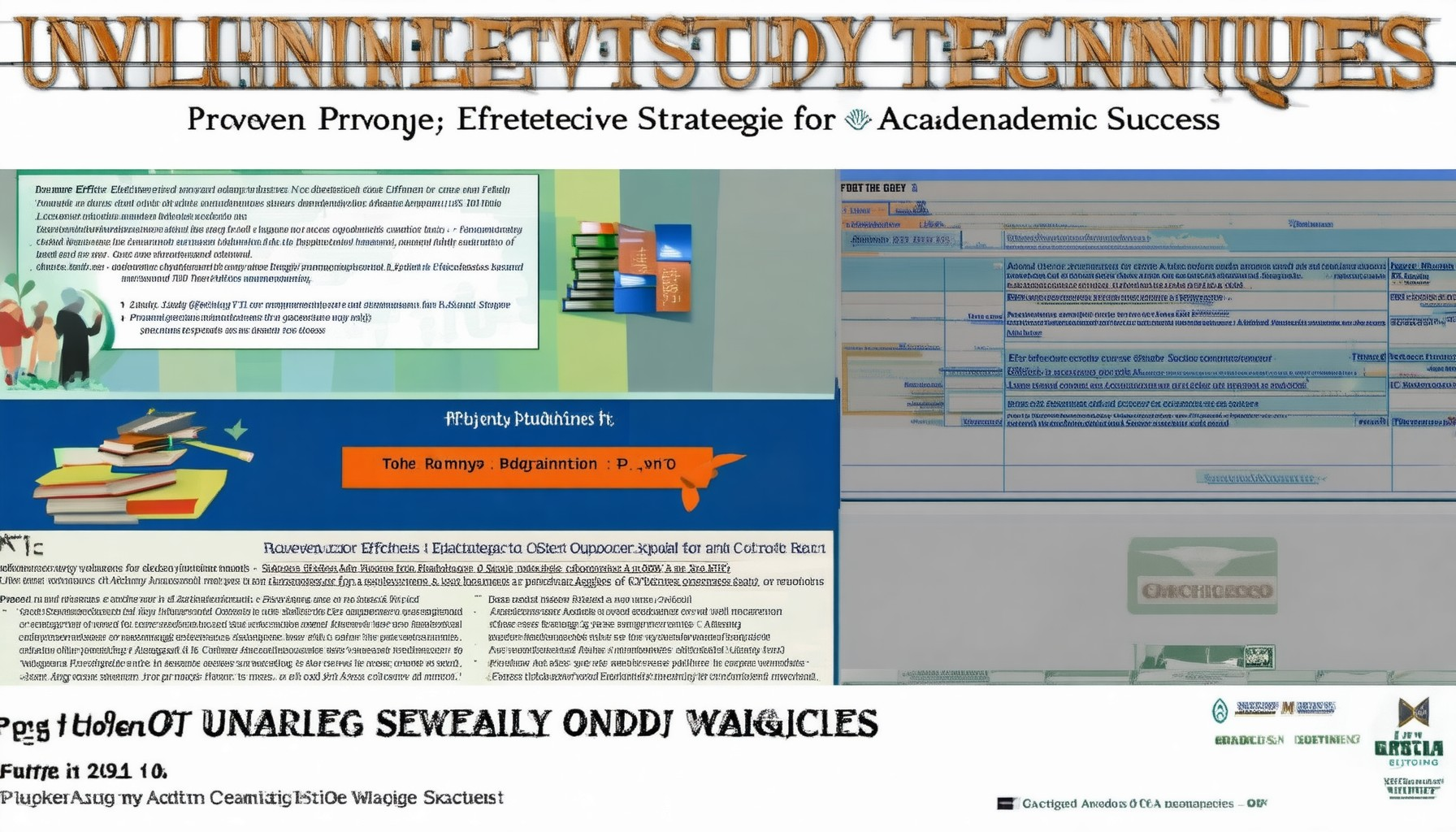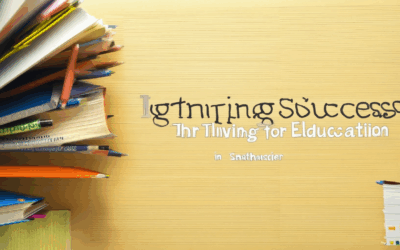Studying efficiently is often the key to academic success, but finding the right techniques can feel overwhelming. Whether you’re struggling with staying focused or looking to optimize your learning process, understanding effective study techniques can make a significant difference. From mastering the 1/2/3 method to leveraging memory techniques, there are countless strategies designed to enhance your learning experience. In this comprehensive guide, we’ll explore proven study methods, time management tips, and technological tools that can help you achieve your full potential. By adopting the best study techniques, you can unlock your cognitive potential and excel in your academic journey. Let’s dive into the secrets of effective studying and discover how you can become a top performer.
Key Takeaways
– Set Clear, Long-Term Goals: Define your academic objectives to drive motivation and focus.
– Master Effective Time Management: Balance schoolwork with hobbies and relaxation through strategic scheduling.
– Develop a Consistent Study Routine: Incorporate active learning techniques and regular breaks to enhance retention.
– Stay Curious and Creative: Approach learning with curiosity and engage in critical thinking to foster innovation.
– Build Strong Relationships: Collaborate with peers and mentors for feedback and personal growth.
– Continuous Self-Improvement: Reflect on progress, seek resources, and stay updated in your field.
– Leverage Proven Study Techniques: Use active recall, spaced repetition, interleaved practice, and other methods for improved learning.
– Teach Others to Solidify Understanding: Explain concepts to others to strengthen your grasp and retention.
– Chunk Information Effectively: Break complex material into manageable parts for easier processing.
– Visualize Connections with Mind Mapping: Create engaging visual representations of concepts for deeper understanding.
– Eliminate Distractors: Focus on key terms and main ideas to enhance study efficiency.
– Set Measurable Goals: Break objectives into smaller tasks and track progress to stay on target.
– Stay Motivated Through Rewards and Support: Use personal incentives and surround yourself with a supportive network.
– Prioritize Sleep for Optimal Learning: Ensure adequate rest to support memory consolidation and efficiency.
The 1/2/3 Method for Effective Studying
The 1/2/3 method is a proven strategy for improving study efficiency and retention. This approach helps learners optimize their study sessions by spacing out their efforts over time rather than cramming.
What Does the 1/2/3 Method Entail?
- Step 1: Initial Learning Session – Dedicate the first session to understanding the material. This is typically the most intensive phase where you absorb new information.
- Step 2: Spaced Recall – Review the material after a short break (e.g., 24 hours). This phase tests your ability to recall information from memory, reinforcing weak points.
- Step 3: Deep Reinforcement – Revisit the material after several days or weeks. This phase cements the knowledge through active retrieval, enhancing long-term retention.
Why the 1/2/3 Method Works
This method leverages the spacing effect , which studies show improves retention compared to mass study sessions. It also aligns with principles from cognitive science that emphasize distributed practice over cramming.
Benefits of Using the 1/2/3 Method
- Improved Retention: Spaced repetition enhances long-term memory.
- Reduced Burnout: Shorter, spaced study sessions reduce mental fatigue.
- Better Understanding: Revisiting material over time deepens comprehension.
How to Implement the 1/2/3 Method Effectively
Start by allocating specific time blocks for each phase. For example, spend the first hour learning new material, the next day’s study session focused on recall, and then revisit the topic a week later for reinforcement.
When to Use the 1/2/3 Method
This method is particularly effective for subjects requiring memorization, such as vocabulary, formulas, or historical dates. It’s less suitable for tasks involving problem-solving or creative thinking.
Competitor Analysis
While the 1/2/3 method is highly effective, other techniques like the spaced repetition system and active recall also yield similar results. Experiment with different methods to find what works best for your learning style.
By incorporating the 1/2/3 method into your study routine, you can significantly enhance your learning outcomes and reduce the pressure associated with traditional cramming.
Do Study Techniques Really Work?
Yes, study techniques can significantly enhance learning effectiveness and retention. Here’s how they work:
Active Engagement
- Actively engaging with material through methods like summarizing, asking questions, or teaching others helps reinforce understanding and retention.
- These techniques trigger deeper cognitive processing, making information more accessible for long-term memory storage.
Spaced Repetition
- Revisiting information at increasing intervals helps consolidate knowledge over time.
- This method is particularly effective for retaining complex concepts and vocabulary.
Elaboration
- Connecting new information to prior knowledge creates stronger neural pathways in the brain.
- This process enhances comprehension and makes information more meaningful.
Mind Mapping
- Visualizing information through diagrams or outlines improves recall and organization.
- Mind maps help in identifying relationships between concepts and making connections.
Interleaved Practice
- Mixing different topics or subjects during study sessions promotes better overall understanding.
- This approach prevents rote memorization and fosters a deeper grasp of the material.
Teaching Others
- Explaining concepts to others reinforces your own understanding.
- Teaching acts as a powerful tool for internalizing information and identifying gaps in knowledge.
Chunking
- Breaking down information into smaller, manageable pieces makes it easier to process.
- This technique reduces cognitive overload and improves retention rates.
By incorporating these techniques, you can optimize your study habits and achieve better results. To further enhance your learning experience, visit Enroll Maven for expert tips and resources tailored to your academic journey.
What is the 10 Rule for Studying?
The 10 rules for effective studying are a set of guidelines designed to maximize learning efficiency and retention. These principles, often discussed in educational circles, emphasize active learning, spaced repetition, and strategic planning. By adhering to these rules, students can significantly improve their study habits and academic performance.
- 1. Prioritize Quality Over Quantity: Focus on understanding core concepts rather than passively reading large amounts of material. Engage deeply with the subject matter through active thinking and questioning.
- 2. Schedule Regular Study Sessions: Establish a consistent study routine, allocating specific times for each subject or topic. Consistency helps reinforce memory and knowledge retention.
- 3. Use Spaced Repetition: Review material at increasing intervals over time. This method leverages the brain’s ability to retain information more effectively when topics are revisited after periods of time.
- 4. Break Information into Chunks: Limit study sessions to 25-30 minutes at a time, focusing on one subject or task before moving on. This prevents mental fatigue and enhances focus.
- 5. Practice Active Recall: Test yourself frequently during study sessions by asking questions or summarizing what you’ve learned. This strengthens memory encoding and retrieval processes.
- 6. Sleep on It: Allow your brain time to consolidate learning by sleeping after studying. This phase is crucial for transferring new information into long-term memory.
- 7. Engage with the Material: Interact with the content actively, whether through note-taking, teaching others, or applying concepts to real-world scenarios. Engagement boosts comprehension and retention.
- 8. Stay Organized and Visual: Use tools like flashcards, mind maps, or planners to keep track of what you’re learning. Visual aids and organization can significantly improve study effectiveness.
- 9. Seek Feedback and Input: Regularly ask for input from teachers, peers, or mentors. This provides perspective and helps identify areas for improvement in your study methods.
- 10. Maintain a Healthy Lifestyle: Exercise regularly, manage stress, and ensure you’re getting adequate nutrition and sleep. Physical health directly impacts cognitive function and study performance.
By incorporating these 10 rules into your study routine, you can create a more effective and enjoyable learning experience. Remember, the goal is not just to accumulate information but to truly understand and retain it for future use.
How to Be a Top 1% Student
Becoming a top 1% student requires a combination of dedication, strategy, and smart habits. Here’s a step-by-step guide to help you achieve this goal:
- Mindset and Goals: Set clear, long-term goals for yourself. Whether it’s acing exams, mastering a subject, or excelling in extracurricular activities, having a defined purpose will drive your efforts.
- Effective Time Management: Create a detailed schedule that balances schoolwork, hobbies, and relaxation. Prioritize tasks based on deadlines and importance to maximize productivity.
- Master Study Habits: Develop a consistent study routine that includes regular review sessions, active learning techniques, and breaks to prevent burnout. Utilize tools like flashcards, summaries, and mind maps to reinforce memory.
- Stay Curious and Creative: Approach learning with curiosity. Ask questions, explore different perspectives, and think critically. Engage in creative problem-solving to develop innovative solutions.
- Build Strong Relationships: Collaborate with peers, teachers, and mentors. Seek feedback regularly and maintain open communication to grow personally and academically.
- Continuous Self-Improvement: Reflect on your progress, identify areas for growth, and seek resources to enhance your skills. Stay updated with the latest knowledge and technologies in your field.
To support your journey, visit Enroll Maven for exclusive tips, guides, and resources designed to help you excel academically and personally. Explore our comprehensive learning strategies, college prep materials, and community-driven insights to stay ahead of the curve.
Effective Study Techniques to Improve Learning
Learning effectively requires a combination of strategies that enhance retention, comprehension, and application. Here are some proven techniques that can significantly improve your learning process:
1. Active Recall
Active recall is a memory technique that involves actively retrieving information from your memory rather than passively rereading notes. This method enhances long-term retention by strengthening neural connections in your brain.
- Test yourself frequently on the material.
- Space out your study sessions to reinforce memory traces.
- Use flashcards or create your own study aids.
Tip: Pair active recall with related articles to maximize its effectiveness.
2. Spaced Repetition
Spaced repetition is a powerful learning strategy that capitalizes on the spacing effect, allowing you to revisit information at optimal intervals to ensure long-term retention.
- Review your notes at increasing intervals over time.
- Use apps like Anki or Quizlet to schedule your repetitions.
- Apply the 20-80 rule: revisit information 80% of the time after the initial learning session.
Tip: Combine spaced repetition with complementary techniques for better outcomes.
3. Interleaved Practice
Interleaved practice involves mixing different topics or subjects during your study sessions. This approach prevents rote memorization and helps you build a stronger understanding of interconnected concepts.
- Mix up your study topics to keep your brain engaged.
- Practice problem-solving by integrating real-world applications.
- Use this method when preparing for exams or projects.
Tip: Explore additional resources to refine your approach.
4. Teach Others
Teaching is one of the most effective ways to solidify your understanding of a concept. Explaining ideas to others forces you to organize your thoughts and identify gaps in your knowledge.
- Create study groups or pair up with peers for teaching sessions.
- Record yourself explaining complex topics to reinforce your own learning.
- Use this method before exams or major assignments.
Tip: Check out related guides to enhance your teaching skills.
5. Chunking
Chunking is a cognitive strategy that allows you to break down large amounts of information into smaller, manageable pieces. This makes studying less overwhelming and more efficient.
- Divide lengthy texts or lectures into digestible sections.
- Use visual organizers like mind maps or outlines.
- Apply chunking when studying for standardized tests.
Tip: Discover more advanced chunking techniques in this article .
6. Mind Mapping
Mind mapping is a creative study technique that helps you visualize relationships between concepts. It’s particularly useful for connecting ideas and building a holistic understanding.
- Start with a central idea and branch out into related concepts.
- Use colors and images to make your map more engaging.
- Apply mind mapping to subjects like biology, chemistry, and history.
Tip: Enhance your mind mapping skills with expert tips .
7. Elimination Method
The elimination method helps you focus on the most important information by removing irrelevant details. This technique is especially useful for studying for exams or high-stakes assessments.
- Identify and eliminate distractors in your study materials.
- Focus on key terms and main ideas in textbooks or lecture notes.
- Practice this method regularly to build discernment.
Tip: Master the elimination method with step-by-step guides .
8. Set Clear Goals
Having clear, measurable goals keeps you motivated and focused. Whether it’s acing an exam or mastering a skill, knowing what you’re aiming for drives better study habits.
- Break your objectives into smaller, achievable tasks.
- Track your progress to stay on target.
- Adjust your goals as your understanding deepens.
Tip: Learn how to set and achieve goals in this resource .
9. Stay Motivated
Motivation is the driving force behind consistent study habits. Without it, even the best techniques may fall by the wayside. Find what keeps you inspired and stick with it.
- Set personal rewards for completing study sessions.
- Surround yourself with supportive friends or mentors.
- Keep a study journal to track your progress and successes.
Tip: Discover more motivation hacks in this article .
10. Get Enough Sleep
Sleep plays a crucial role in memory consolidation and learning efficiency. Prioritize rest to ensure your brain has enough time to process and retain information.
- Aim for 7-9 hours of quality sleep each night.
- Take short naps during study breaks if possible.
- Establish a consistent sleep schedule.
Tip: Explore the impact of sleep on learning in this guide .
Effective Study Techniques to Improve Learning
Learning effectively requires a combination of strategies that cater to different learning styles and habits. Here are some proven techniques to enhance your learning process:
- Active Recall : Test yourself frequently on the material you’ve learned. This method reinforces memory and helps solidify concepts.
- Spaced Repetition : Review information at increasing intervals over time. This technique is particularly effective for long-term retention.
- Interleaved Practice : Mix different topics or subjects during study sessions. This approach prevents rote memorization and enhances overall understanding.
- Elaboration : Go beyond surface-level understanding by connecting new information to what you already know. This strengthens cognitive associations.
- Chunking : Break complex information into smaller, manageable parts. This makes it easier to process and retain.
- Creativity in Learning : Engage with the material creatively, such as teaching it to someone else or using visualization techniques.
- Consistency : Establish a regular study routine and stick to it. Consistency is key to building strong learning habits.
- Focus on Weak Areas : Identify your weaker subjects or topics and dedicate extra time to master them. This targeted approach yields significant improvements.
- Use Multiple Senses : Engage different senses by reading, listening to podcasts, or watching videos related to the subject matter.
- Stay Organized : Use planners or digital tools to track your progress and manage your study schedule effectively.
By incorporating these techniques into your study routine, you can significantly enhance your learning outcomes and retention capabilities. Remember, the key to effective learning lies in finding the right balance of strategy and personalization.
Conclusion
Mastering these study techniques takes practice and patience. With consistent effort and the right approach, anyone can improve their learning abilities and achieve their academic goals. Keep experimenting with different methods and stay committed to your journey toward success!









0 Comments